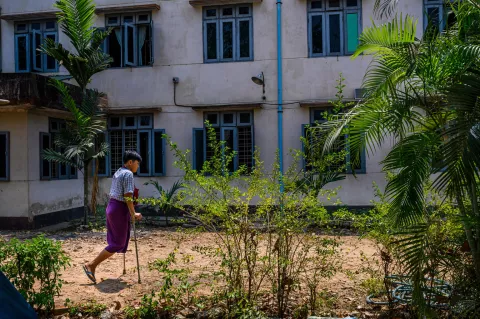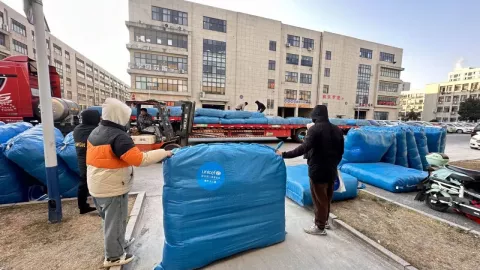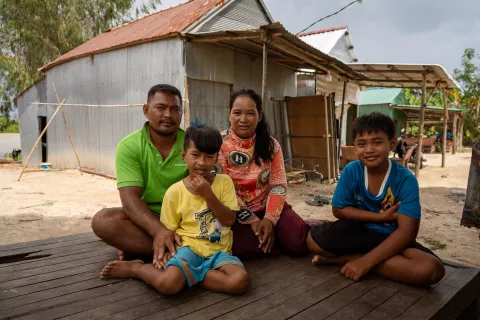Communities make children’s early learning possible in Timor-Leste
With few public preschools, many children, particularly those in rural areas, miss out on the opportunity of early learning
With few public pre-schools in Timor-Leste, many children, particularly those in rural areas, miss out on the opportunity of early learning. UNICEF is working with the Ministry of Education, Village Councils and parents to set up community pre-schools to help children get the best start in life.
VIQUEQUE, Timor-Leste, 25 September 2017 – “Ida, rua, tolu, hat, lima, nen, hitu, walu. Se mak badinas ba eskola buka matenek to’o hetan. Haksolok ba, haksolok ba, hader dader saan ba eskola” (One, two, three, four, five, six, seven, eight. We love to go to school to get knowledge. Be happy, be happy. Wake up in the morning to go to school).
Luzeria Ornai, 3, sings the ba eskola (Going to school) song along with other children her age at a community pre-school in Ossu, one of 59 in the Viqueque Municipality that is supported by UNICEF.

Luzeria Ornai (first child on the left) and her classmates at the UNICEF-supported community pre-school
A school on the doorstep
Without the community pre-school, Luzeria would not have the opportunity of early learning as the nearest public pre-school is about three kilometers away.
With limited public transport, children in Luzeria’s community had to wait until they were old enough to walk to the nearest primary school, skipping pre-school. This makes them prone to repeat the first grade – around 24 per cent of them, according to 2016 data from the Ministry of Education.
“I’m really happy that now we have a pre-school close to our homes. As a community we can look after our children,” says Manuel Ruas one of the members of the aldeai (village) council and a member of the community pre-school School Management Committee (SMC). “The children are very happy. They don’t have to walk far to be able to go to pre-school.”
Two of Manuel’s grandchildren are attending the pre-school. “As a SMC member, I also help look after the children. I supervise that everything is going well with the pre-school and the facilitators,” he says, proud of his contribution to the education of the young children in his village.

Manuel Ruas is a member of the School Management Committee and Village Council is supporting the community pre-school in his village
Preparing for the future
Luzeria’s mother, Angelica Ornai, 27, is also happy that Luzeria and her brother Dionildo, 5, now have a chance to attend pre-school.
“I come here every day [there is a class] and help look after the children. We, parents, sometimes contribute $0.25 for the snacks of children or for other materials for the pre-school,” she says.
Angelica and parents like her in the community see how such an organized early learning programme can help prepare their children for formal schooling.
“Here in the pre-school they learn how to recognize letters and count. They sing a lot of songs and interact with other children,” Angelica says, adding that this helps children prepare for Grade 1. She is confident that her children will do well once they go to primary school.
Giving children like Luzeria and Dionildo a pre-school experience provides a stimulating environment that supports their brain development. When children play, they’re learning skills that will equip them for all of life’s challenges, like how to solve problems or why it’s important to share, and other social skills that will help them navigate our complex world.
Evidence indicates quality pre-school education is a sound investment and ensures children get the best start in life.

Students participate in the community based pre-school
Reaching children in remote areas
Establishing the community pre-schools is part of UNICEF’s support to the Ministry of Education of Timor-Leste to innovate and reach children in remote parts of the country.
According to the 2015 census, 72 per cent of the population live in rural areas. There are few public pre-schools and those that exist are mostly concentrated in urban areas or municipal capitals. Pre-school enrolment stood at around 16.9 per cent in 2016 for the whole country, one of the lowest in Southeast Asia.
Currently being modelled in two of Timor-Leste's 13 municipalities, this is the first time community pre-schools are being implemented at scale in the country. UNICEF also supports parenting education sessions for parents of children attending the community pre-schools.
Community driven
A cornerstone of the UNICEF-supported pre-schools is community ownership that is ensured through a consultative process before establishing the pre-school.
The School Management Committee (SMC) consists of two to three members from the community, working together with the community pre-school facilitators to ensure that classes take place. They are identified by the community members and are volunteers. SMC members are also often among the leaders from the community, either the Village Chief or a member of the Village Council like Manuel.
UNICEF with the support of its partners, the New Zealand government, H&M Foundation and The Morgan Foundation, provides trainings to the facilitators and supply learning materials to the community pre-schools. Facilitators also use locally available materials to create toys and learning materials for the children.
With the active engagement of these volunteer facilitators, parents and community leaders, children like Luzeria and her brother Dionildo will continue to get an opportunity for a brighter future through pre-school education.



